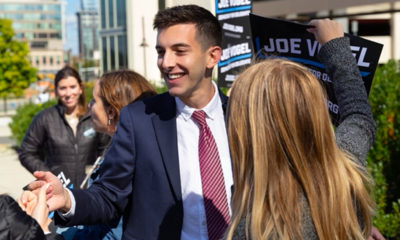Commentary
Is Israel ‘gay heaven?’ It’s complicated
American LGBT delegation visits Middle East
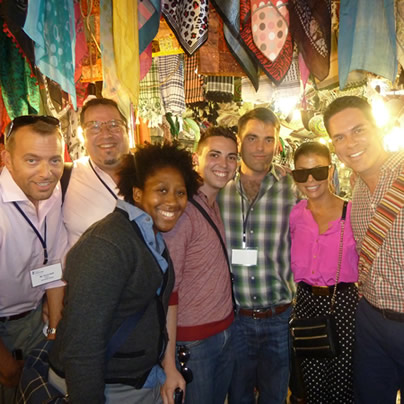
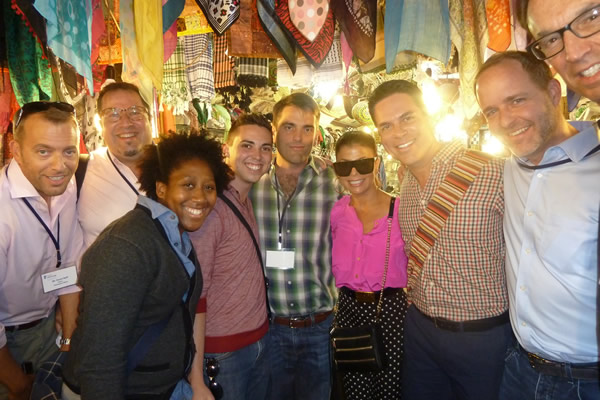
Project Interchange participants ran into Paula Abdul in the Jerusalem market. From left-right: Kevin Naff, Andy Sacher, Tamika Butler, John Campbell, Brad Sears, Paula Abdul, Jorge Valencia, Kirk Fordham and Malcolm Lazin. (Photo courtesy Project Interchange)
When a delegation of nine LGBT leaders from the United States arrived last month in Israel for an intensive seminar, we knew the gay residents of progressive Tel Aviv enjoyed broad acceptance and myriad legal protections. But imagine our surprise when TV personality Gal Uchovsky announced that we had arrived in “gay heaven.”
Israel is “the best LGBT country in the world,” he told us, adding that the nation’s LGBT residents face no serious problems that he could identify. A gay child growing up in rural Israel is better off than a similar kid in the rural United States, he observed. Homelessness is rare here and Israeli parents embrace their gay kids because, well, better to be gay than dead.
Uchovsky is a proud cheerleader for his country, which is endearing, though his privileged worldview has perhaps shielded him from some unpleasant, inconvenient realities. Life for LGBT Israelis is, indeed, more complicated than Uchovsky’s rosy assessment and, thus, our trip’s catchphrase was cemented: “It’s complicated.”
The stellar seminar, sponsored by Project Interchange, a program of the American Jewish Committee, brought me well out of my comfort zone and right into Ramallah and to the edge of the Gaza Strip. The focus of the visit — LGBT issues — was often overshadowed by the frustrating stalemate of the Palestinian-Israeli conflict. Why can’t the two sides come to an agreement on a two-state solution? It’s complicated. And, as we learned, it’s far more complicated than American mainstream media seem to grasp.
And so from the West Bank to Jerusalem to Tel Aviv to the Negev, the nine of us trekked to learn all we could from a diverse range of perspectives, including from Palestinians and Israeli experts critical of the country’s record on LGBT rights. The other eight participants in the weeklong seminar were: Log Cabin Republicans Executive Director Gregory T. Angelo; Tamika Butler of Young Invincibles; gay Harrisburg (Pa.) Treasurer John Campbell; Gill Action Fund Executive Director Kirk Fordham; Equality Forum Executive Director Malcolm Lazin; Lavender Effect Executive Director Andy Sacher; Williams Institute Executive Director Brad Sears; and Point Foundation CEO Jorge Valencia.
We toured Tel Aviv’s bustling, posh community center, touted as the only such center in the world that is municipally owned. The government’s funding of such centers and related LGBT causes is a mixed bag. In the United States, small LGBT non-profits and HIV service providers jockey for limited public grants, often leading to turf wars. But most such U.S. groups aren’t beholden to the government or muzzled by fears of government retaliation. It’s not clear that the same is true in Israel. It’s a dilemma: accept public money to advance your important work and mute your criticisms of the government or reject public funds and risk financial shortfalls that will curb programming. As one speaker put it, “I’d rather our public money went to gay causes than to building another bomb.”
The highlight of that visit for me was hearing from Uzi Even, the first openly gay member of the Knesset and a pioneering elder statesman of the Israeli LGBT rights movement who has helped rid the military of discriminatory policies and liberalize adoption laws. In a true sign of the times, his latest cause involves sorting out Israel’s divorce laws as they relate to same-sex couples.
My advice to Israeli LGBT advocates: Take time now to celebrate and honor the contributions of Even and others like him. Record his personal history and share it with young people. It wasn’t so long ago in Israel when gay sex acts were illegal. Such lightning-speed progress doesn’t happen by accident and brave pioneers like Even deserve our gratitude.
As we made our way up the stairs to meet with Even in the community center, we could hear the giggles of young children and stepped over a pile of neatly arranged kids sneakers in a hallway. Another sign of the times.
Several speakers emphasized the role that a 2009 shooting played in advancing gay acceptance. On Aug. 1, 2009, a gunman burst into the LGBT community center in Tel Aviv and opened fire, killing two and injuring at least 15 others. It’s hard to quantify how significant a role that tragedy played in changing Israeli attitudes toward gays, but our speakers agreed it was a turning point.
It’s a stark contrast to what we see in the United States, where violent hate crimes continue to plague our community, from trans women routinely killed in our inner cities to the recent murder of a gay man in the heart of New York’s gay village. Americans are so inured to violence that these crimes barely register in the mainstream media, let alone lead to a widespread change in attitudes.
After a couple of days in progressive Tel Aviv, we made our way to Jerusalem. In addition to the usual religious sites, a group of us visited the Jerusalem Open House, an LGBT community center engaged in broad grassroots work in the face of complicated problems like funding, space constraints, religious critics who have sometimes turned violent and the ever-present challenge of building relations with Arab residents of the city.
Celebrating gay pride in Jerusalem has been complicated, too. They don’t agree on much, but anti-gay animus was something that united the world’s major religions as conservative Jewish and Arab leaders denounced plans for pride parades in the holy city in recent years. In 2005, marchers were attacked by an ultra-orthodox Jewish man who stabbed three participants. The following year, Jerusalem was selected to host WorldPride, which led to more unrest and violent protests. Some lawmakers in the Knesset attempted to ban gay pride parades in Jerusalem, but those efforts fizzled. Our hosts in Jerusalem insist that relations are improving and that Pride is safer than in the recent past. Here, another stark contrast to the way we celebrate in the United States, with our corporate-sponsored pride villages, beer gardens and all-night parties.
From Jerusalem, we took a daytrip and toured Efrat, a small city in the Gush Etzion settlement bloc with its mayor, Oded Ravivi. The issue of settlements commands a lot of attention in U.S. media coverage of Israel and so I was curious and excited to see one up close. Efrat has eschewed the barbed wire fences that snake through so much of the Israeli landscape and officials have worked to cultivate economic ties with surrounding Palestinian villages. But we learned that such efforts only go so far. When the mayor approached a Palestinian schoolmaster about sending teachers to Efrat to teach Arabic to Israeli kids, he declined, fearing he would be “slaughtered” for collaborating with the Jews.
It was a sobering reminder of how moderates on both sides of the divide are thwarted by the extremists in their midst. Is there a cautionary lesson here for Americans, as our own political rhetoric becomes increasingly dominated by the most extreme, shrill voices of the far left and right; our legislators afraid to compromise and be seen as collaborating with the opposition?
In one awkward moment, a member of our group asked Mayor Ravivi how he would react if one of his children came out to him as gay. He seemed startled by the question and suggested it couldn’t happen in his family. Cue the eye rolling among some of us. Such reactions are common among many who proclaim they don’t discriminate but haven’t devoted much thought to the underlying issues. Gay kids are good for conservative politicians — just ask Dick Cheney.
After absorbing the complicated problems and history of Jerusalem, some of us needed a release and our gracious hosts at Open House took us to the lone gay bar in Jerusalem, called Video, where we had a few drinks and danced till the wee hours alongside a diverse crowd of revelers. Music, indeed, makes the people come together.
Accusations of ‘pinkwashing’
The concept of “pinkwashing” emerged as a hot topic throughout the week. Some critics claim the country’s embrace of LGBT rights is merely a propaganda effort to claim the mantle of modernity and establish a stark contrast to homophobic regimes in the West Bank, Gaza and elsewhere in the Middle East. These critics claim the government’s support for gay rights doesn’t threaten or undermine the structure of Israel and amounts to a “fig leaf,” and an attempt at distracting attention from the difficult problems of finding peace with the Palestinians.
I’m not convinced. Politics is about the art of the possible, not the ideal and certainly not the perfect. Sometimes we have to accept imperfect solutions or motives in the interest of securing protections for people in need. What’s most striking about Israel’s LGBT record isn’t what it has achieved legislatively or through court rulings, but the fact that all this progress is happening in the heart of the Middle East. Our group trip featuring nine outspoken American LGBT advocates is simply not possible anywhere else in the region. Even compared to the progress we’ve seen recently in the United States, Israel stands out because it is such a young country enacting these reforms. Americans are notoriously forward thinking and, as a result, we tend to forget our history. It was less than 10 years ago when President George W. Bush called for a federal constitutional amendment banning same-sex marriage and scores of states enacted their own constitutional bans. The architect of this shameful attack on LGBT rights was Ken Mehlman, a closeted gay man and modern-day Roy Cohn who has since come out as gay and now raises money for marriage equality campaigns. The change afoot is new and fast but fragile. Would America be seeing such dramatic change now if Mitt Romney had won last year’s election?
Meanwhile, Israel opened its military to out gays and lesbians and transgender service members — something still barred by the U.S. military. There is relationship recognition, if not full marriage equality. The government directly funds and supports the LGBT movement, for better or worse. And it doesn’t hide that support, but promotes it.
Still, some see nefarious motives.
Upon returning home from this trip, I received a letter criticizing the visit from a group called New York City Queers Against Israeli Apartheid. It read, in part:
“The delegation met with some unspecified ‘Palestinian officials in Ramallah,’ which strikes us as nothing but a token gesture. Worse, ‘pinkwashing’ — the attempt to use Israel’s supposedly decent record on gay rights to whitewash Israeli occupation and apartheid — has been front and center in international LGBT organizing over the past several years, particularly in the US. Any delegation of LGBT ‘leaders’ to Israel that doesn’t address it is clearly intended to contribute to pinkwashing.”
Our group was sensitive to pinkwashing from the outset and several of us requested meetings with gay Palestinians and their representatives. Project Interchange worked hard to provide a balanced view of the issues and invited two Palestinian LGBT groups — alQaws and Aswat — to meet with us. Officials at the Tel Aviv and Jerusalem LGBT centers were also asked if they could assist in persuading those groups to meet our delegation or knew of other Palestinian LGBT representatives who would be willing to meet us. Sadly, the groups refused to meet with us. Change is simply not possible without dialogue and I deeply regret this lost opportunity the Palestinians had to engage with an open-minded group of visitors seeking nothing more than understanding and education.
(I invited NYCQAIP to respond to this story and they accepted. I look forward to publishing their reaction and thoughts on pinkwashing in the coming days.)
In Ramallah, we were scheduled to meet with Dr. Saeb Erekat, the chief Palestinian negotiator. He cancelled his appearance and we learned why the next day: He had just submitted his resignation to Palestinian President Mahmoud Abbas over frustration with the pace of negotiations. Abbas rejected Erekat’s resignation but it’s clear that the current talks, which began four months ago with a John Kerry-instigated deadline of nine months, are not going well. Given the sorry record of our involvement in decades of failed talks, perhaps it’s time for the United States to step aside and allow another party a chance at diplomacy.
In Erekat’s place, we met with Abu Zayyad, a scholar and Fatah and PLO adviser. It seemed somewhat silly to ask him about the state of LGBT affairs given all the day-to-day challenges facing Palestinians in the West Bank. But he insisted that there is a level of gay acceptance, even if such views differ widely among family members, noting there are no laws in Ramallah related to gay issues and that there are at least two non-governmental organizations that espouse gay rights. He spent most of his lecture discussing the state of life for Palestinians and much of what he said was not encouraging. He lamented the lack of mobility for Palestinians, who don’t have passports, making international travel difficult at best. Locally, the checkpoints that Ramallah residents must navigate just to visit nearby Jerusalem create daily headaches. Zayyad, who said he spent three months in prison for participating in an anti-Israel protest, fears that a two-state solution will be impossible five years from now, when an estimated one million Israelis could be living in West Bank settlements.
“It will explode again,” he warned.
It’s often been said that Israel is a land of contradictions and that assessment came into sharp focus during our visit. Israel celebrates its status as the only Democracy in the Middle East, while its non-Jewish residents live under a flag adorned with religious iconography. In a nation so steeped in history, Israel is just 65 years old and is surprisingly lacking in many traditions. Located in the heart of the Middle East, where homosexuality can be punished by jail time or even death as in Iran, Israel has emerged as one of the world’s most pro-LGBT nations. A country that is more than 60 percent desert has perfected drip irrigation and desalinated water from the Mediterranean to solve a decades-old water crisis. And in a nation with such ancient religious influences, a large chunk of the population — estimated by one speaker as high as 50 percent — identifies as secular or atheist.
It’s impossible to summarize our weeklong adventure in a couple thousand words. A sincere and heartfelt thank-you to the team at Project Interchange, all of our speakers and to the people of Israel for their hospitality. In addition to the aforementioned experiences, we met with law professor Aeyal Gross, entrepreneur Hamutal Meridor, Times of Israel editor David Horovitz, Jerusalem Post reporter Khaled Abu Toameh, former Knesset member Einat Wilif, film director Eytan Fox and many others. We were serenaded by Ivri Lider; walked the Stations of the Cross; toured Yad Vashem, the Western Wall tunnels, the Mahaneh Yehuda Market and indulged in far too much of Israel’s impressive cuisine. We visited Sderot, Mitzpe Ramon and slathered ourselves in mud before floating in the Dead Sea.
It was in that moment — nine of us standing half naked, covered in mud — that I perceived a lasting bond forming among us. Despite our differing views on policy back home and occasional misunderstandings, we’d been through something emotional, powerful and unique together. An experience impossible to explain or summarize here, because, well, it’s complicated.
Kevin Naff is editor of the Washington Blade. Reach him at [email protected].
Commentary
Preserving our tapestry: Navigating European elections, empowering queer women and the imperative of safe spaces
EU elections will take place in June 9

As the European Union anticipates the upcoming elections in June, a disconcerting wave of transphobic rhetoric has swept across the continent, notably in 21 EU member states, according to a recent report by ILGA-Europe. The 13th Annual Review of the Human Rights Situation of LGBTQ People in Europe and Central Asia stresses the alarming rise in hate speech targeting the LGBTQ and intersex community. This growth in negativity — which particularly is directed at transgender people — raises profound concerns about the state of inclusivity, human rights and democracy within the EU.
The alarming surge of transphobia in European politics
According to the report, there is a trend of hate speech coming from politicians across 32 European countries of which 21 being EU member states. Painting a stark picture of the challenges faced by the LGBTQ community. In a staggering list that includes Austria, Germany, Spain and others, politicians have increasingly weaponized anti-trans rhetoric. Exploiting children is a tactic often used as part of scare strategies to create opposition to trans minors’ access to healthcare and educational facilities, extending this divisive approach to a broader trend where politicians argue that restricting information about LGBTQ people is a necessity to protect minors.

The rise in transphobic rhetoric is not only confined to politics but it has other tangible consequences. The report highlights a concerning escalation in suicide rates and mental health issues, particularly in LGBTQ youth. Violent protests outside schools and libraries have created unsafe environments, adding to the growing list of challenges faced by the community.
The far-reaching impact of demonization by politicians and the introduction of restrictive legislation underscores the need for urgent action. Hate speech is not merely an affront to people’s rights, it is an assault on the very core values upon which the EU was founded. As ILGA-Europe Advocacy Director Katrin Hugendubel notes, human rights, especially those of LGBTQ people, are facing a significant challenge from far-right forces. The exploitation of LGBTQ rights to undermine democracy, human rights and the rule of law highlights the divisive nature of the current political landscape.
As ILGA-Europe prepares to launch the “Come Out 4 Europe” campaign in response to these alarming trends, the need for visible and supportive queer female spaces is more apparent than ever. The campaign, seeking commitments from European Parliament candidates to protect the rights of LGBTQ people, underscores the urgency of safeguarding human rights, democracy and freedom.
The crucial role of queer women in European elections
Belgium, amid this backdrop of rising transphobia, is preparing for the European elections on June 9, 2024. The importance of this electoral process cannot be overstated, especially for queer women. With citizens aged 16 and above casting their votes to elect 22 members of the European Parliament (MEPs), it’s a pivotal moment for the LGBTQ community.
The voting process in Belgium follows EU law, utilizing a proportional representation system. Voters choose one party, either by marking the box above the party list or selecting individual candidates on the list. The total ballot forms for each party determine seat distribution, and preferential votes then decide which candidates secure a seat in the European Parliament.
Educated voting in the European elections is essential to queer women and the importance cannot be stressed enough. Throughout history they have faced unique battles, but this community holds the power to shape policies that directly influence their lives. By engaging in the democratic process, queer women can actively challenge the current surge in hate speech towards trans people by voting for electing representatives who actively advocate for LGBTQ rights.
Representation is more than a mere buzzword. It matters. Understanding candidates’ positions on LGBTQ issues is key and requires educating oneself on candidates’ stances as to allow queer women to vote for representatives who genuinely champion LGBTQ rights. A diverse and inclusive representation ensures that the concerns and voices of the queer community are not just heard but which are acted upon. Decisions within the European Parliament influence policies ranging from anti-discrimination laws to access to healthcare. An informed vote makes sure that legislation promotes equality, acceptance and the protection of LGBTQ rights.
By being educated on the European elections and its candidates, queer women embark on a journey of self-empowerment. By supporting candidates who prioritize inclusive curricula, they contribute to addressing LGBTQ history, health and rights, encouraging a more accepting future.
The undeniable need for physical queer women spaces
Since the European elections are nearing, the importance of physical spaces for queer women to gather and discuss voting and the candidates becomes increasingly evident. While online spaces offer the chance to connect and discuss, they come with their own unique challenges, including the spread of misinformation and miscommunication. In navigating the democratic landscape, the value of in-person gatherings for education and discussion cannot be stressed enough.
The world is saturated with digital information, and misinformation can easily infiltrate online spaces. Physical gatherings allow for a more controlled environment with direct feedback from peers, where queer women can share accurate and reliable information, ensuring a more nuanced understanding of candidates, policies and the electoral process.
In the lead-up to the European elections, we have to recognize that physical spaces for queer women are crucial. They do not only combat misinformation, disinformation and miscommunication but also serve as a vital space for shared learning. In-person gatherings create the foundation for an informed and engaged electorate, promoting a collective voice that resonates in the democratic process. The power of change lies not just in our votes but in the shared wisdom and unity forged in the physical spaces we create together.
The plight of the Crazy Circle and the call for investment in queer women spaces
After the closing of Brussels’ iconic Crazy Circle, a feminist queer space that has served as a safe haven for the LGBTQ community, it becomes increasingly evident that the struggle for queer women-only spaces in Belgium is a critical issue demanding our attention.
For the past five years, Crazy Circle has been a testament to the resilience of the LGBTQ community, creating a safe and celebratory space for queer women and their allies. However, its closure after the previous management leaving for unknown reasons and current fundraising attempt by the new owners to reopen highlight the challenges faced by such spaces in Belgium. These establishments play a vital role not only as social hubs but as catalysts for education, empowerment and advocacy. Fortunately for the new owners they recently reached their fundraising goals and raised over 50,000 euros to reopen Crazy Circle.
The loss of a space like this underscores the broader struggle faced by queer women-only spaces in Belgium. Beyond being social hubs, these spaces are vital agents of change, providing a haven for education, empowerment and advocacy. We must recognize that our commitment to the LGBTQ community extends beyond words.
The “Come Out 4 Europe” campaign by ILGA-Europe serves as a proactive response to the alarming trends in hate speech. It calls for clear political commitments on safeguarding human rights, democracy and freedom from candidates in the upcoming European Parliament elections in June. Belgium, with its own elections on the horizon, stands at a crossroads where the choices made will resonate far beyond its borders.
If we want to inform queer females about campaigns like “Come Out 4 Europe” we need spaces like the Crazy Circle. Its closure is a stark reminder of the fragility of these vital spaces. It’s a call to action, urging us to invest more in preserving and expanding queer women-only spaces. The struggle faced by Crazy Circle is not an isolated incident; it reflects a broader challenge that demands a collective response all over the world.
By fighting to preserve and expand queer women-only spaces, we are not merely safeguarding physical venues. We are investing in the education, empowerment and advocacy of the LGBTQ community. These spaces are not mere bars or gathering spots; they are crucial agents of change and empowerment.
Building a future of inclusivity
As we see what happened to Crazy Circle in Belgium, let us use this moment as a catalyst for change. It is time to rally together behind existing queer women spaces, ensuring their survival and actively working towards expanding and creating new ones. By doing so we empower individuals to educate, advocate, and, most importantly, vote for a future where safety, equality and acceptance prevail for all members of the LGBTQ community. It’s not only a matter of choice to preserve these spaces; it is a commitment to a world where everyone has the right to be safe, heard and celebrated.
In navigating the complex tapestry of the European elections, the empowerment of queer women spaces through informed voting and the preservation of physical queer women spaces become integral threads. As we stand on the precipice of change, our choices today will shape the inclusive and accepting future we envision. Together, let us weave a tapestry that celebrates diversity, protects human rights and builds a future where every voice, especially those of queer women, is not just heard but cherished.
Commentary
Returning to the kibbutz: A journey of heartbreak and hope
Hamas militants attacked Kfar Aza on Oct. 7
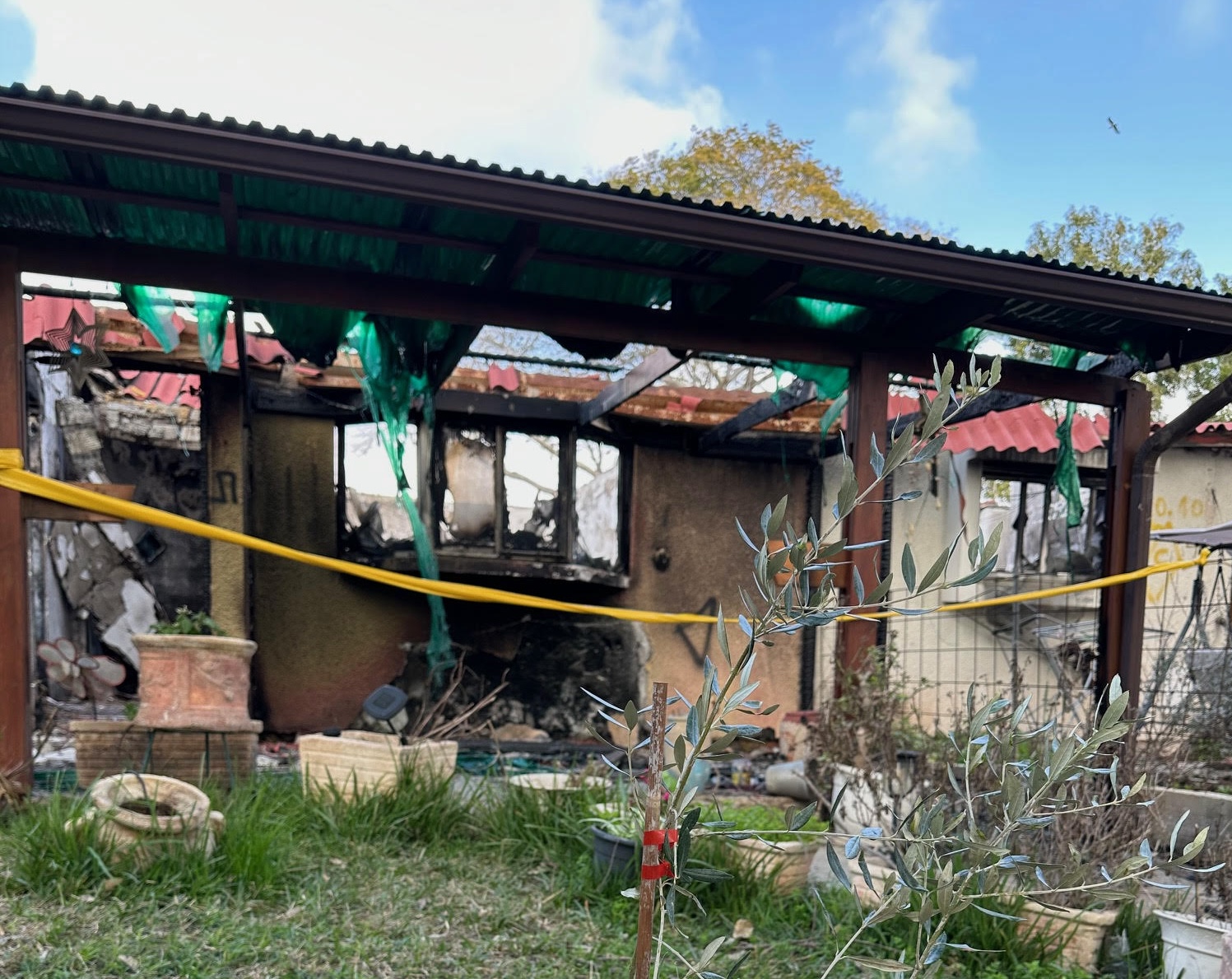
BY K.T. COLIN | In 2019, my first encounter with Israel was through the lens of a sponsored Birthright trip. I embarked on a three-week journey, traversing the diverse landscapes from the northern regions to the eastern territories and finally to the arid southern desert. I had the opportunity to visit different communities within Israel and Palestine. Amidst this exploration, I spent an unforgettable three days and two nights in a kibbutz situated near the Gaza border. The memories etched in my heart were ones of unbridled joy, resilience and the harmonious coexistence of the desert dwellers — an emotional tapestry that forever imprinted itself on my soul. Coming from an Iraqi heritage, I viewed these expressions of coexistence through a lens shaped by my own region’s history of conflict and diversity.
As I recall the Shabbat dinner at the kibbutz, the air resonated with the sacred call to prayers (Adhan) from a nearby Bedouin Arab-Muslim town. The juxtaposition of cultures and faiths was a poignant reminder of the shared humanity that bound the Jewish and Arab Israelis in this region. It was a journey that transcended the ordinary, leaving an indelible mark on my consciousness. Filled with memories of peace and unity, I returned, only to confront a reality far removed from my cherished memories.
Fast forward to last month, when I returned to the Negev Desert, specifically to Kfar Aza — one of the 22 kibbutzim targeted by Hamas on that fateful day, Oct. 7, 2023. The once vibrant oasis, brimming with the light of life, now stood shrouded in the darkness of war-induced death and destruction. The very bench where camaraderie blossomed in 2019, while sharing a moment of connection with an Israeli companion, lay reduced to ashes. The thriving pathways, once bustling with life, had metamorphosed into haunting reminders of blood and rubble. The faces that animated Shabbat gatherings, weaving tales of peace advocacy between Palestinians and Israelis, were now conspicuously absent. In the wake of Hamas’s brutality, no entity — be it human, animal or plant — escaped unscathed. The aftermath resembled scenes from an apocalyptic movie, a tableau of sensory deprivation dominated by the stench of death and the echoes of destruction. This destruction, while uniquely harrowing, echoed the all-too-familiar scenes of conflict from my childhood in Iraq, underscoring the universal tragedy of war.
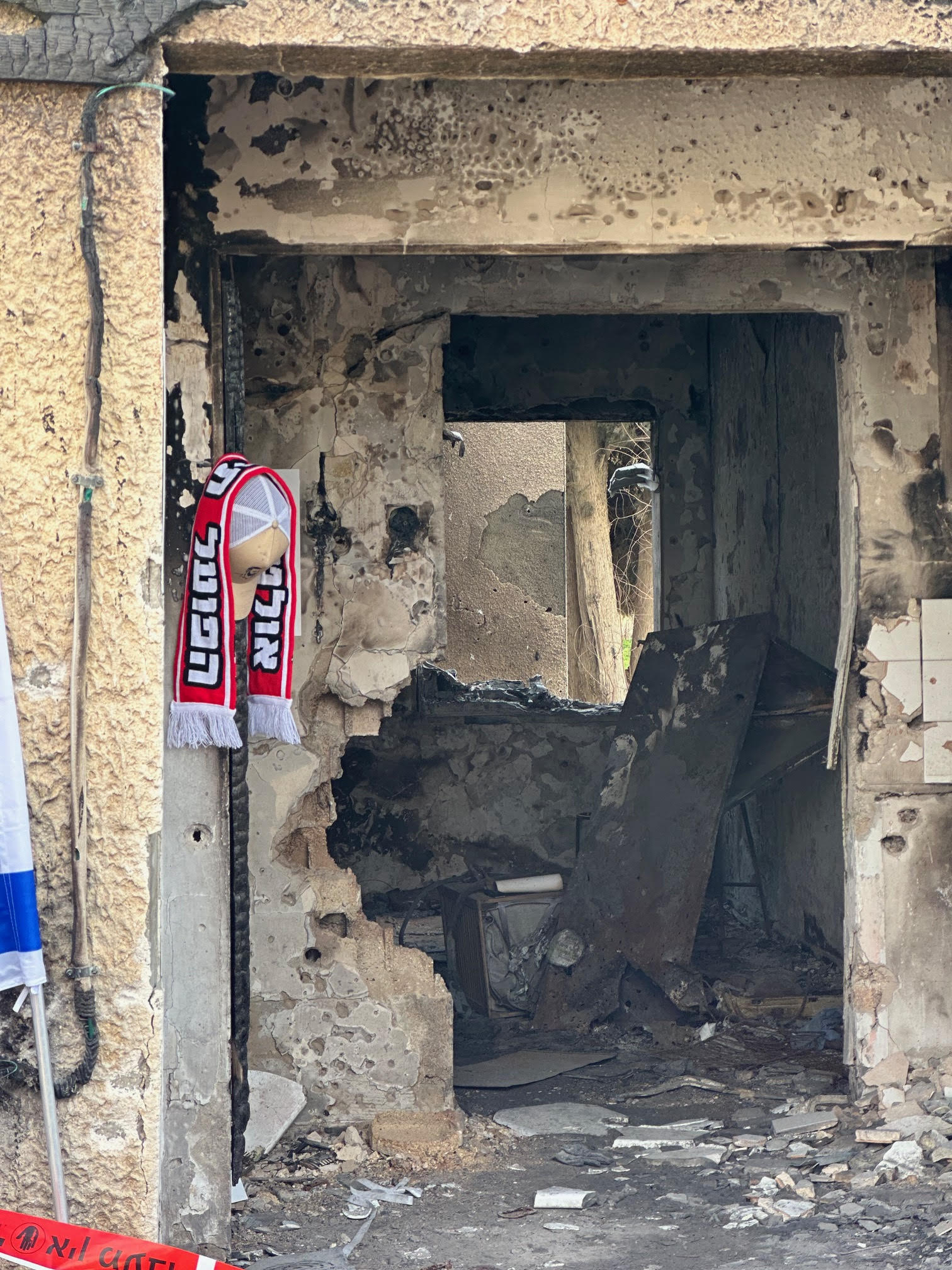
While my roots trace back to Iraq, a land marred by wars and the brutality of conflict, the devastation witnessed in Kfar Aza struck a chord that reverberated with the echoes of my past. My personal journey, from witnessing Saddam’s reign of terror to observing the aftermath in Kfar Aza, underscores a broader narrative of resilience and the enduring hope for peace. Born during the Iraqi-Iranian war, my father’s absence for the first six months of my life spoke volumes about the toll of conflict. The invasion of Kuwait and subsequent wars entrenched the narrative of war as an unwelcome companion in our daily lives. Memories of the U.S. invasion in 2003, the ensuing civil war, and the subsequent loss of rights for women, secular individuals and LGBTQ+ members further underscored the harsh reality of conflict.
Yet, Kfar Aza was a unique chapter in my journey, revealing a form of malevolence that transcended my prior experiences. In their assault, Hamas meticulously targeted specifically peace activists who wanted nothing but peace and prosperity between Israelis and Palestinians, sparing no atrocity in their pursuit. This was not just about taking lives; it was a heinous assault on the very prospect of peace. The evil that unfolded reminded me of the forces mentioned in the Quran — Yaajooj and Maajooj — entities of pure malevolence against whom even Alexander the Great erected a wall, according to Muslim prophecy.
My upbringing in Iraq, under the shadow of Saddam Hussein’s dictatorship, fanned the flames of anti-Semitism. A once diverse Iraq, home to 165,000 Iraqi Jews, witnessed their forced exodus through decades of genocide. Subsequently, Christians, Yazidis and Sabbea Mandaeen fell victim to ethnic cleansing orchestrated by dictatorial regimes, Nazi pogroms, Iranian militias and ISIS. The slow erosion of tolerance and coexistence occurred methodically, propelled by hate campaigns championed by Arab nationalists and later fueled by Islamist movements, plunging Iraq into its darkest era.
My school days were marked by compulsory flag-greeting ceremonies, ostensibly patriotic but laden with hate. The chants of “Death to America; Death to the Zionists; Death to the Jews” echoed through the air, fostering a culture of animosity. Arabization and Nationalism classes further fueled this bigotry, leaving an indelible mark on impressionable minds.
The recent horrors in Kfar Aza echoed memories of a similar brand of terror perpetrated by Saddam’s regime — the Fedaeen of Saddam, a precursor to Hamas’s brutality. The parallels were chilling — beheadings, brutal punishments and a reign of terror continued even after the fall of Saddam, as they joined Al-Qaeda, leaving a trail of atrocities in cities like Fallujah and Ramadi.
As I witnessed the devastation in Kfar Aza, the echoes of war in nearby Beit Hanoun, Gaza, resonated hauntingly. The pain echoed from both sides — the Israeli people enduring Hamas rockets since 2015 and the Palestinians suffering daily under the same regime. My heart shattered for the children left orphaned, the LGBTQ+ Gazans now without shelter or life-saving medications and the vulnerable girls and boys exposed to the horrors of Human trafficking and rape. The theft of humanitarian aid by Hamas left many without food and water, and the lip services to Palestinians by Arab and Muslim majority nations, painting a grim picture of a future hanging in uncertainty for those who survived.
Despite the deep scars of conflict, both in my homeland and here, I see glimmers of hope that guide us toward a shared future. I have endured the darkest chapters of conflict in my past, and I hold onto the belief that one day this war will end. I dream of a future where Israelis and Palestinians coexist in shared spaces, attending the same schools, dining at the same restaurants and dancing in the same nightclubs. Having witnessed such unity among Jews, Druze, Muslims and Christians in Israel, I pray for a day when this reality extends to Gazans and Israelis in the Negev Desert. The journey towards peace is arduous, but the human spirit, resilient and compassionate, holds the promise of a brighter tomorrow.
Commentary
Why come to Washington Plaza Baptist Church?
It’s about the preaching, the people, and the purpose
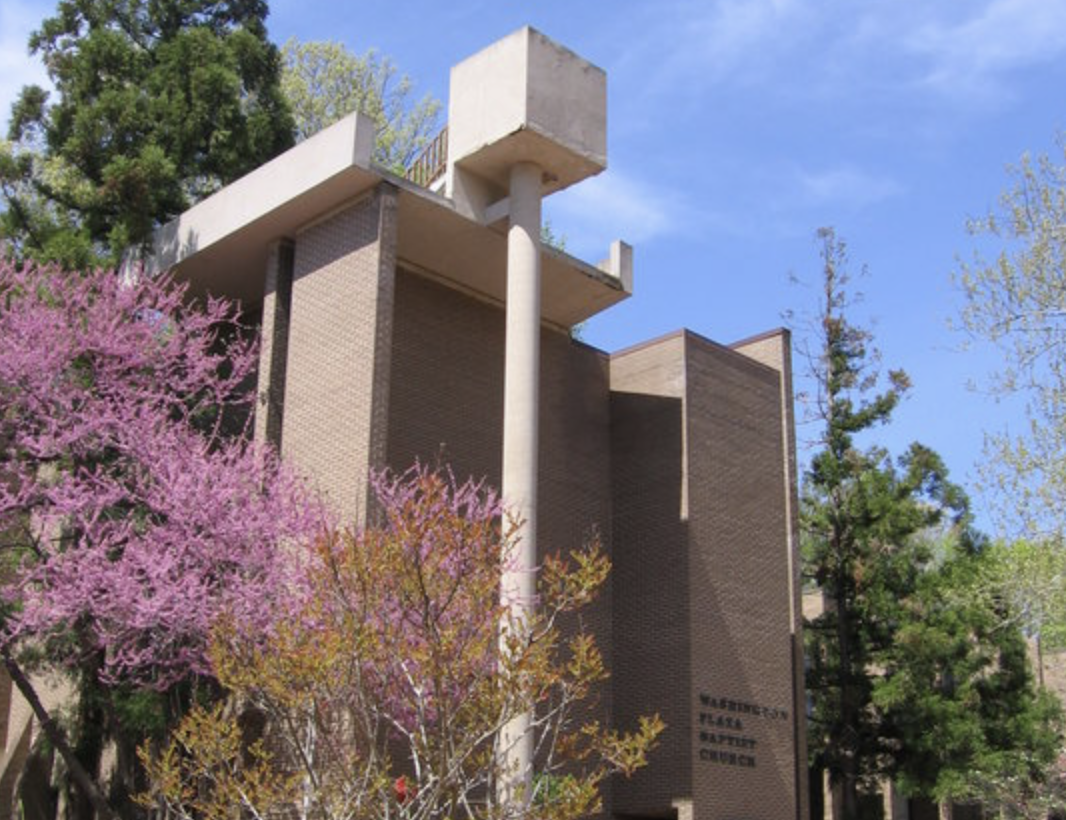
BY ZITA COLLINS | I grew up in a Lutheran church before I really knew who I was. Before my own opinions and belief system were formed. Before “welcoming and affirming” churches existed.
I did the “expected” thing: got married to a man, had children, became a wife and a mom. But I knew there was more to me than that, the part I had to keep hidden because of the society “norms” so many years ago. I attended a Mormon church because that was the type of church my husband attended. As I became more myself having my own opinions and thoughts, and my husband tried to be more controlling, the marriage, of course, failed.
I quit church. I moved on in life and met a wonderful woman. I knew there was a God, but I figured since I was “living in sin” He didn’t like me too much. My way of looking at it was “God, you stay in your corner and I’ll stay in mine, and we’ll get along just fine.” Four years later, in September 1982, my partner was diagnosed with cancer. A couple of months later, she passed away.
During those few months my friend invited me to go to her Assembly of God church. I became a regular. One Sunday in January 1983, I gave my heart and life to Christ, becoming a full-fledged believer. And once again, I gradually put away the part of me that was “unacceptable to God.”
As time went on, I attended various churches. I attended an Anglican church for 15 years. I loved God, but I could not reconcile how I felt — my LGBTQ self — with scripture as I knew it at that time. It was at a church leadership meeting, when we were voting on a new marriage policy to exclude gay marriage, that I realized my “calling”: to tell the LGBTQ community that God really loves them and accepts them as they are.
I studied scripture, praying for clarity, and realized that those “clobber verses” have been traditionally misinterpreted, misunderstood, or taken out of context. I began looking for a church that was friendly to the gay community. I learned that the correct terminology is “welcoming and affirming.”
And I found Washington Plaza Baptist Church!
Warm and welcoming, I felt I had found a home. They knew my identity from the start, as I had let it be known that I was looking for a “welcoming and affirming” church. And they loved and accepted me.
So Who is Washington Plaza Baptist Church?
WPBC is a progressive American Baptist church, located on Lake Anne Plaza, with a long and rich history. It was the first church in Reston, Va., a part of Robert E. Simon’s design for the new town named after him. Washington Plaza Baptist Church is an inclusive Christian Community whose worship, communion, and fellowship are open to all. We are a safe place for all people to worship regardless of race, creed, age, cultural background, gender, or sexual orientation. We affirm that all have access to the love of Christ and service to God.
WPBC is very active in Pride. We were involved with the formation of the first Reston Pride and continue to participate each year. We open our fellowship hall for the performers to change and to cool off, and we have a table on the Plaza where we give away free Pride paraphernalia as well as hugs. WPBC has held weddings for same-sex couples — including my wife’s and mine — with most of our members helping in some way to make the day special.
At Washington Plaza Baptist Church, I have been fully embraced for who I am. I have been in leadership from early on. The pastor, Rev. Michelle Nickens, delivers sermons that are powerful and relevant, with a focus on being Christ-like in all areas, including social justice. The people live out their claim of inclusivity and affirmation. The church community truly loves and cares about the people within the church as well as those outside its doors.
Our address is 1615 Washington Plaza West, Reston, Va. Reach us at 703-471 5225, [email protected]. (We’re on Lake Anne Plaza, right next door to the Lake Anne Coffee House and Wine Bar.)





